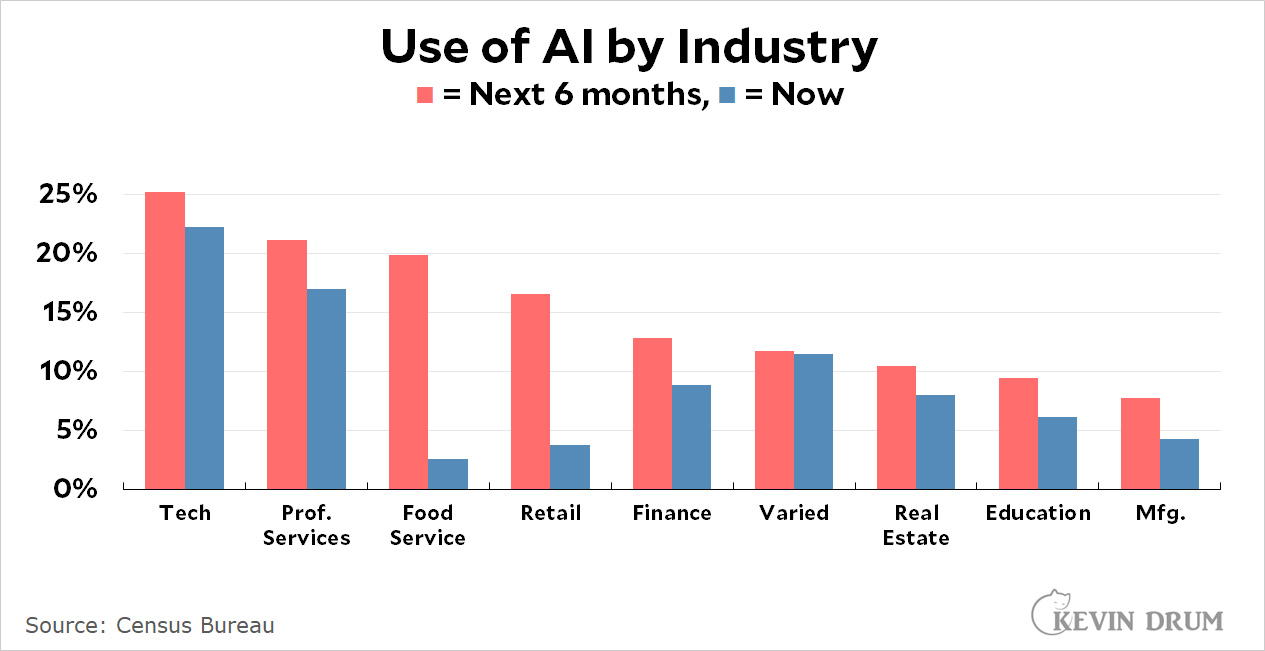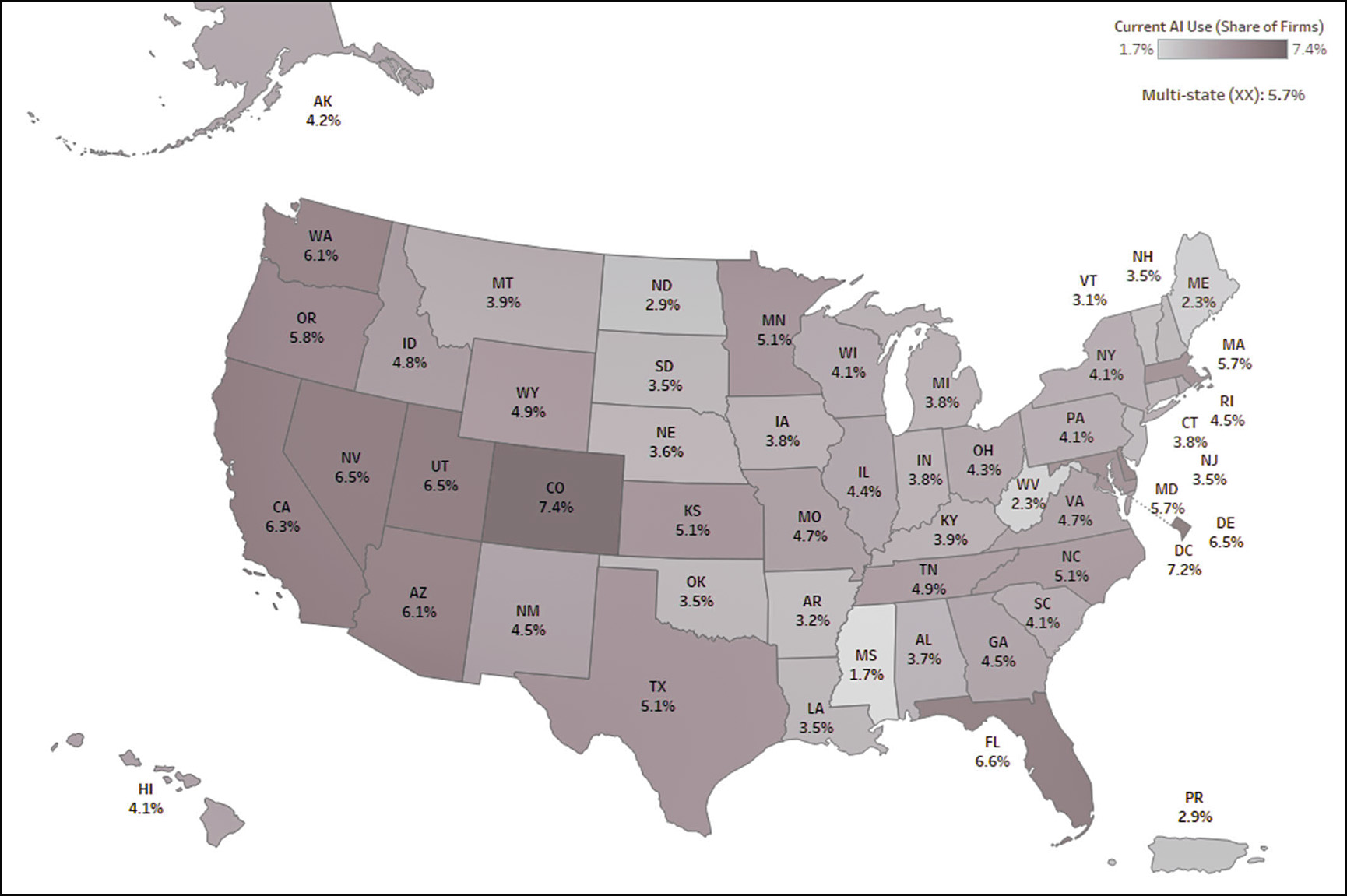The Census Bureau has released some new survey data about AI use and it's pretty interesting. Overall use of AI is still fairly low: about 5.4% of firms report using it now, expected to rise to 6.6% in autumn. Of those firms who report using AI, here's what they say they're using it for:
 All told, this means that in the near future about a third of AI will be used to replace workers and another third will be used to replace existing computer systems.
All told, this means that in the near future about a third of AI will be used to replace workers and another third will be used to replace existing computer systems.
Here are the top ten industries by expected use of AI in the near future:
 Food service and retail are fascinating: both report fairly limited use of AI right now but expect huge increases over the next few months.
Food service and retail are fascinating: both report fairly limited use of AI right now but expect huge increases over the next few months.
Finally, here is overall AI use by state:
 Colorado is #1. I wouldn't have guessed that. Mississippi is #50. I would have guessed that.
Colorado is #1. I wouldn't have guessed that. Mississippi is #50. I would have guessed that.

All told, this means that in the near future about a third of AI will be used to replace workers and another third will be used to replace existing computer systems.
What does the other third do?
Colorado is quickly becoming what Austin has loudly been trying to be.
My company was was a San Francisco company before Covid, when we went fully remote. Since then the majority of the engineers we've hired are in Colorado. There's a solid tech community there and they're about 15% cheaper than Bay Area hires.
colorado springs is home to quite a bit of defense related tech whose organizations have famously deep pockets
(and the CO state gov't isn't nearly as loony as TX)
schriever
peterson
re the use of AI in CO...
monitoring satellite maneuvers and launch detection systems are good use cases for automated systems
(offensive systems... not so much)
ai will certainly put many paid grammar checkers out of business in the next few years
working well in NYC https://themarkup.org/news/2024/03/29/nycs-ai-chatbot-tells-businesses-to-break-the-law
As Cary Doctorow says, AI won't be able to actually do your job but it's vendors will be able to convince your boss that it can do your job.
I've been saying for some time now that AI will be to white collar professionals in the 21st century what electro-motive power was to blue collar workers in the 20th.
That is, AI won't replace white collar professionals like doctors, lawyers and engineers, but it will harvest the higher paying skills like computation/ analysis/ logic, changing the human role to that of a machine tender/ last mile delivery person.
I have spoken to doctors and lawyers who are already using AI and are seeing the impact on their industries. Law firms will need less 1st year associates because AI can provide functionality to increase productivity and the firm can function with less people (and billable hours). My doctor uses AI daily to help with diagnosis, which he said is quite brilliant, unless it is having an hallucination. Haven't checked with my son (engineering) at a major hi tech manufacturing company, but would not be surprised if AI has not impacted his industry.
In my old business (corporate banking), it would not surprise me to see AI in heavy use, especially with write-ups of company background, and credit analysis.
Humans are not known for quickly adopting and adapting to new tools. Just because the boss wants to buy they hype doesn't make it so.
Food service--so replace people taking orders with kiosks? Not really AI. So the kiosks now take orders verbally, ok that is AI....
There isn't any real intelligence in Mississippi, let alone artificial, since William Faulkner died.
Automation, machine learning, AI, whatever you want to call it is starting to show up in places I wouldn't expect. The chat AI, as I have said before, will providing a good front end for things but there are other aspects of AI/ML that I think will have a bigger impact. A few days ago they were doing some drain pipe work on the road near my house. Instead of a person waving people through on each end there were just automated gates and lights. I can't prove conclusively that it identified my car combined with nobody coming the other way and switched to let me through but it surely felt like that was what happened.
I do think there is a problem here: The meaning of "AI". I doubt that a language model (if someone had properly described what it does AND DOES NOT do) would have been called artificial intelligence 10 or 20 years ago. It would have been called something more modest because that wasn't what "AI" (more precisely: "I") meant in people's mind.
Now what we see is every innovation in the software area gets sold as AI. This is the cheap way of making AI successful: Define it down!